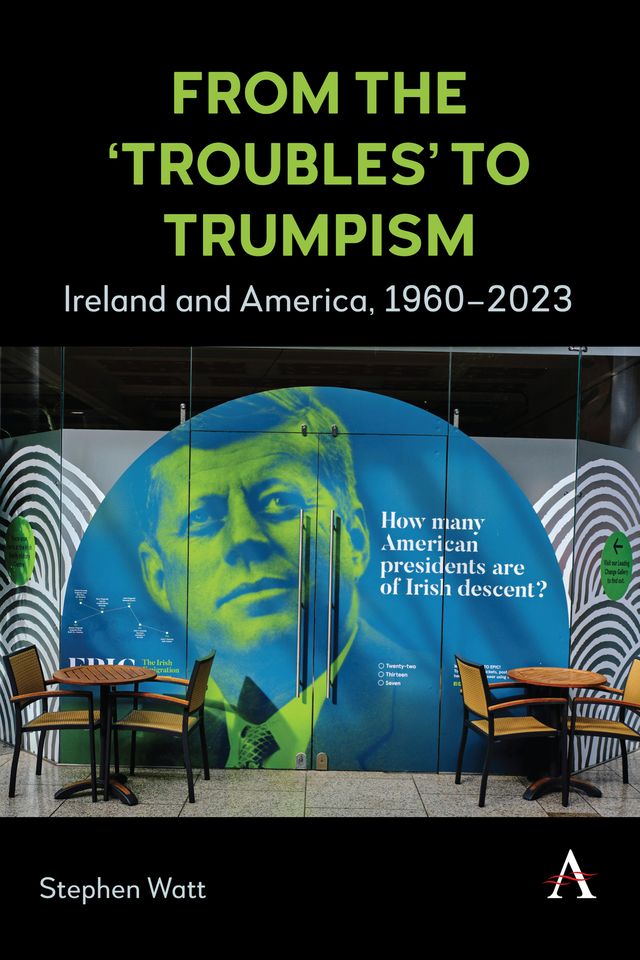Stephen Watt
ISBN: 9781839992650
Pages: 246
Pub Date: September 2024
Imprint: Anthem Press
Stephen Watt
ISBN: 9781839992650
Pages: 246
Pub Date: September 2024
Imprint: Anthem Press
The essays in this book attempt to follow Jan Kott’s counsel by combining historical investigation with cultural criticism to illuminate the present moment, particularly the present American moment. In this regard, the dates 1960 and 1923 in the book’s subtitle are by no means accidental. The first three chapters concern the history of America’s relationship with Ireland during the administrations of the presidents whose terms spanned the immediate pre-history and history of the Troubles. After a glance backward at American and Irish relations in the nineteenth century, the first chapter focuses on the 1960 election of John F. Kennedy, the first Catholic president in America’s history and the first to visit Ireland during his term of office. It also juxtaposes Kennedy’s jubilant 1963 trip to Ireland with Ronald Reagan’s more complicated homecoming in 1984. The next two chapters examine relationships between Ireland, Northern Ireland and the United States from the time of the Kennedy assassination through the administrations of Richard Nixon, Gerald Ford, Jimmy Carter, Ronald Reagan and Bill Clinton, who in 1995 became the first American president to visit Northern Ireland during his presidency. The fourth chapter begins by juxtaposing the literacy and urbanity of presidents like Joe Biden and Michael D. Higgins of Ireland with the aversion to reading of President Biden’s predecessor, suggesting the advisability of electing readers as national leaders. This discussion includes the Democratic party primary before Biden’s 2020 election, the implications of his allusions to Seamus Heaney’s The Cure at Troy during his campaign and his trip to Ireland in 2023 to commemorate the 25th anniversary of the Good Friday Agreement.
Between these chapters, shorter editorials or ‘provocations’ appear that consider analogies between a Northern Irish past and an uncertain American future, the latter of which is reprised in the book’s conclusion. This structural device, commonly called the ‘interchapter’, is hardly original as both creative and scholarly writers have employed it to offer supplements to matters relevant to their larger projects. In his short story collection Walking the Dog (1994), for example, Bernard MacLaverty combines nine stories with ten vignettes, one as short as four lines. In Inventing Ireland: The Literature of the Modern Nation (1995), Declan Kiberd uses interchapters to introduce or add texture to more substantial discussions, as does Richard Rankin Russell for the second edition of Modernity, Place, and Community in Brian Friel’s Drama (2022).
Unlike the book’s chapters, these provocations are not so much scholarly exercises as ‘op-eds’ inflected by the insights not only of Irish writers but also, in the context of Trumpism’s endangerment of American democracy, those conveyed by influential journalists, newspapers and news outlets. There is, admittedly, a certain irony in this undertaking, as Carlos Lozada observes in What Were We Thinking: A Brief Intellectual History of the Trump Era (2021): ‘One of the ironies of our time is that a man who rarely reads, preferring the rage of cable news and Twitter for hours each day, has propelled an onslaught of book-length writing about his presidency’. As the title’s allusion to ‘Trumpism’, not Trump, is meant to indicate, the argument of this book is less concerned with prosecuting an argument ad hominem than with assessing the consequences of his cultivation of societal division as discussed by, among many others, Stephen Marche in The Next Civil War: Dispatches from the American Future (2022) and Jonathan Greenblatt in It Could Happen Here: Why America Is Tipping from Hate to the Unthinkable – And How We Can Stop It (2022). Yet, when juxtaposing threats of violence in contemporary America with those that ravaged Northern Ireland and, however ameliorated, still do, at least one commonality is apparent: in addition to widening socio-economic inequality, to voter suppression, and to racism and misogyny, both civil wars and Troubles require belligerent public figures skilled at stoking hatred in their followers. Thus, From the ‘Troubles’ to Trumpism is a kind of historical retrofitting that reads an increasingly dangerous moment in contemporary America through the lens of recent Irish and Northern Irish history.
